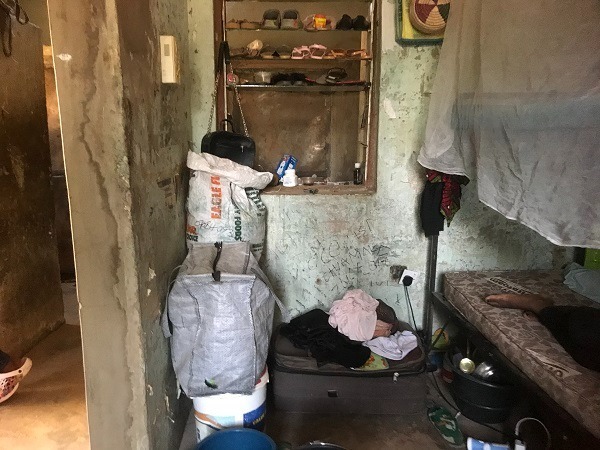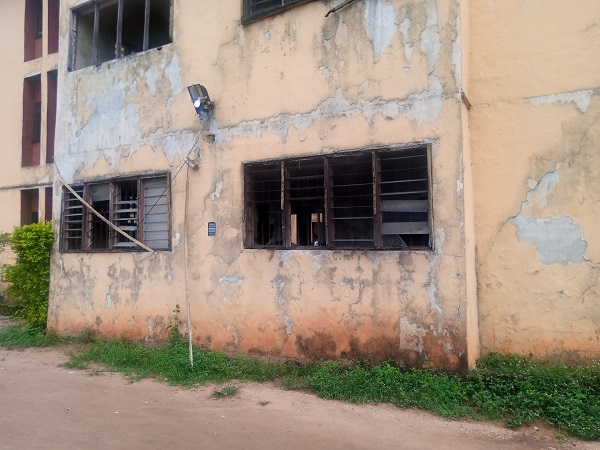Poor infrastructure in Nigeria’s public tertiary institutions has been a source of concern for decades — and this cuts across polytechnics, colleges of education and universities.
It is one of the reasons the Academic Staff Union of Universities (ASUU) recently embarked on its 16th strike in 23 years. Investigations into several institutions across the country revealed findings that were disturbing and unpalatable; students were seen living in derelict hostels, making use of unhygienic facilities and learning in unconducive and abnormal conditions.

From the Federal Polytechnic Kaura Namoda in the north-west to the University of Calabar (UNICAL) in the south-south and the University of Nigeria, Nsukka (UNN) in the south-east, the report found most of the toilet facilities to be squalid – and hardly fit for humans.
At the main campus of Enugu State University of Science and Technology (ESUT) in Agbani, the report discovered a ‘defecation room’ inside a male hostel called Noca Hall, while visitors to the hostels at Usmanu Danfodiyo University Sokoto (UDUS) are immediately greeted by a stench oozing from poorly-managed garbage and unwashed toilets. Trash was seen littering the corridors while most of the toilets were clogged.
In some hostels in Malabo Hall, UNICAL, toilets were filled to the brim with a combination of dirty water, urine and unflushed faeces, while in UNIBEN, the stench from an abandoned toilet is a constant source of disturbance for students who attend lectures nearby.
Although the toilets in Imo State University (IMSU) hostels are relatively neat, during classes, many students conduct their business in the bush and uncompleted buildings around the lecture halls due to the absence of public toilets.
Meanwhile, UniAbuja female students who are unable to use the toilets in their hostels often resort to using adult potties to pass waste. For some female undergraduates of UniAbuja and the Federal Polytechnic of Ado-Ekiti, there is nothing surprising about bathing in the open.
UNN in Enugu is adjudged one of the best in the country but the facilities do not reflect the institution’s elite status. Eni Njoku and Alvan Ikoku, male hostels in the varsity, have seen better days, with the walls now defaced, drainages cloaked, and the environment bushy and unkempt.
The mosquitoes at the Federal University of Technology, Owerri (FUTO) were spoilt for choice, given the free access they had to students courtesy of the broken louvres and torn nets at hostels A, B, C, D and E.

Similar conditions were obtainable at the Ado-Ekiti polytechnic, where the buildings and facilities were starting to cave in, and the surrounding bushes had become infamous for attracting snakes that slither in from time to time to terrorise the female students.
Some hostels in Benue State University were surrounded by bushes and drenched in the stench of litter and waste. Window louvres and planes were missing in most of the crowded hostels that were bereft of electricity and running water. The students also had to contend with leaking roofs which all but guarantees the damage of some property once it rains.
The report also found that regular supply of water is not guaranteed for most undergraduates in government-owned institutions. At the main campus of ESUT in Agbani, students at Noca Hall usually wake up hoping to get water from the taps in the early hours of the day.
While students of Obafemi Awolowo University, Ile-Ife, have water in their hostels – and within close proximity, their counterparts in UNIJOS, Adamawa State Polytechnic and the Federal University of Technology, Minna (FUTMINNA) have to trek long distances to get water.
In Benue State University, FUTO, UNIJOS, ESUT and Michael Okpara University of Agriculture (MOUA), their students all lamented the poor state of medical facilities and supplies at their schools.
In UNN and IMSU, students were seen learning in uncompleted buildings and taking exams inside abandoned projects respectively.

Also in UNN, several lecture halls lack public address (PA) systems, cooling systems and sufficient chairs – a situation familiar to some students of MOUA, for whom it has become normal to stand during lectures or gingerly perch on window frames.
Students of ESUT also complained that the unavailability of PA systems coupled with overcrowded lecture halls make it herculean for them to grasp much during faculty-wide courses.
In the north, some students of UNIJOS sit on stones or bare iron during classes, while those from UDUS and Adamawa State Polytechnic were seen studying in severely dilapidated lecture theatres – and if that is bad, University of Ilorin students have it worse, with open roofs, broken chairs, broken boards, and no electricity in these theatres.
At the Modibbo Adama University of Technology, where lecture theatres are equally a write-off. While at the Federal College of Education, Gombe, students were found sitting on the bare floor to receive lectures as the chairs inside the lecture theatres were mostly damaged.
In UNICAL, once when there was no available lecture room, 100-level students of sociology of education resorted to taking lectures in the open. Some of the students who could not secure a seat had to stand while scribbling the lecturer’s teaching into their notebooks.
On March 30, 2019, the new SIP auditorium at the University of Port Harcourt (UNIPORT) was inaugurated by President Muhammadu Buhari. Two years later, most of the roofs of the expansive building have broken off. Most of the classrooms are flooded and the chairs are disintegrating, indicating a severe dearth of maintenance.
At the University of Ibadan, several lecture theatres and classrooms were found to be in good shape, save for the faculty of education where the chairs were broken and the covers tattered.
Meanwhile, at MOUA — an institution that has several abandoned building projects — students were seen learning in uncompleted buildings and overcrowded classrooms with no functioning cooling system.
The Tertiary Education Trust Fund (TETFund), a revenue obtained from education tax provided by the Federal Inland Revenue Services (FIRS) is to be disbursed for the general improvement of education in federal and state tertiary educations.
However, a spokesperson of TETFUND said the cited projects were not awarded by The Fund, and that the Universities that get funding have the sole responsibility to see the project through.
Source: The Cableng











